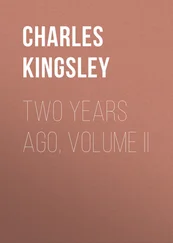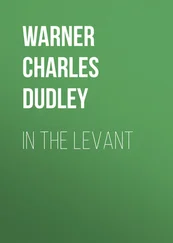Charles Warner - The Gilded Age / A tale of today
Здесь есть возможность читать онлайн «Charles Warner - The Gilded Age / A tale of today» весь текст электронной книги совершенно бесплатно (целиком полную версию без сокращений). В некоторых случаях можно слушать аудио, скачать через торрент в формате fb2 и присутствует краткое содержание. Год выпуска: 2004, Жанр: Классическая проза, на английском языке. Описание произведения, (предисловие) а так же отзывы посетителей доступны на портале библиотеки ЛибКат.
- Название:The Gilded Age / A tale of today
- Автор:
- Жанр:
- Год:2004
- ISBN:нет данных
- Рейтинг книги:3 / 5. Голосов: 1
-
Избранное:Добавить в избранное
- Отзывы:
-
Ваша оценка:
- 60
- 1
- 2
- 3
- 4
- 5
The Gilded Age / A tale of today: краткое содержание, описание и аннотация
Предлагаем к чтению аннотацию, описание, краткое содержание или предисловие (зависит от того, что написал сам автор книги «The Gilded Age / A tale of today»). Если вы не нашли необходимую информацию о книге — напишите в комментариях, мы постараемся отыскать её.
The Gilded Age / A tale of today — читать онлайн бесплатно полную книгу (весь текст) целиком
Ниже представлен текст книги, разбитый по страницам. Система сохранения места последней прочитанной страницы, позволяет с удобством читать онлайн бесплатно книгу «The Gilded Age / A tale of today», без необходимости каждый раз заново искать на чём Вы остановились. Поставьте закладку, и сможете в любой момент перейти на страницу, на которой закончили чтение.
Интервал:
Закладка:
There is no difficulty in digging a bole in the ground, if you have money enough to pay for the digging, but those who try this sort of work are always surprised at the large amount of money necessary to make a small hole. The earth is never willing to yield one product, hidden in her bosom, without an equivalent for it. And when a person asks of her coal, she is quite apt to require gold in exchange.
It was exciting work for all concerned in it. As the tunnel advanced into the rock every day promised to be the golden day. This very blast might disclose the treasure.
The work went on week after week, and at length during the night as well as the daytime. Gangs relieved each other, and the tunnel was every hour, inch by inch and foot by foot, crawling into the mountain. Philip was on the stretch of hope and excitement. Every pay day he saw his funds melting away, and still there was only the faintest show of what the miners call "signs."
The life suited Harry, whose buoyant hopefulness was never disturbed. He made endless calculations, which nobody could understand, of the probable position of the vein. He stood about among the workmen with the busiest air. When he was down at Ilium he called himself the engineer of the works, and he used to spend hours smoking his pipe with the Dutch landlord on the hotel porch, and astonishing the idlers there with the stories of his railroad operations in Missouri. He talked with the landlord, too, about enlarging his hotel, and about buying some village lots, in the prospect of a rise, when the mine was opened. He taught the Dutchman how to mix a great many cooling drinks for the summer time, and had a bill at the hotel, the growing length of which Mr. Dusenheimer contemplated with pleasant anticipations. Mr. Brierly was a very useful and cheering person wherever he went.
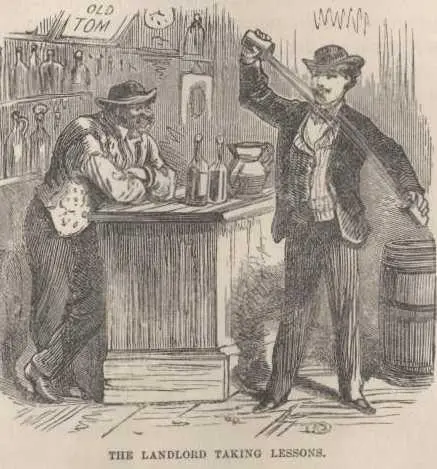
Midsummer arrived: Philip could report to Mr. Bolton only progress, and this was not a cheerful message for him to send to Philadelphia in reply to inquiries that he thought became more and more anxious. Philip himself was a prey to the constant fear that the money would give out before the coal was struck.
At this time Harry was summoned to New York, to attend the trial of Laura Hawkins. It was possible that Philip would have to go also, her lawyer wrote, but they hoped for a postponement. There was important evidence that they could not yet obtain, and he hoped the judge would not force them to a trial unprepared. There were many reasons for a delay, reasons which of course are never mentioned, but which it would seem that a New York judge sometimes must understand, when he grants a postponement upon a motion that seems to the public altogether inadequate.
Harry went, but he soon came back. The trial was put off. Every week we can gain, said the learned counsel, Braham, improves our chances. The popular rage never lasts long.
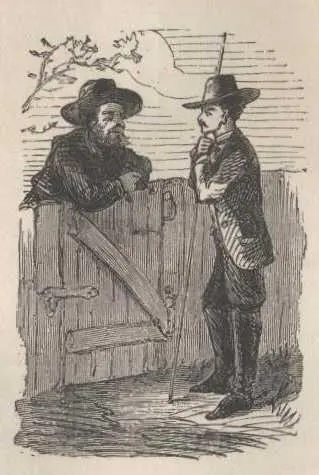
CHAPTER XLIX.
The Coal Vein Found and Lost Again—Philip and the Boltons—Elated and Then Cruelly Disappointed 443
"We've struck it!"
This was the announcement at the tent door that woke Philip out of a sound sleep at dead of night, and shook all the sleepiness out of him in a trice.
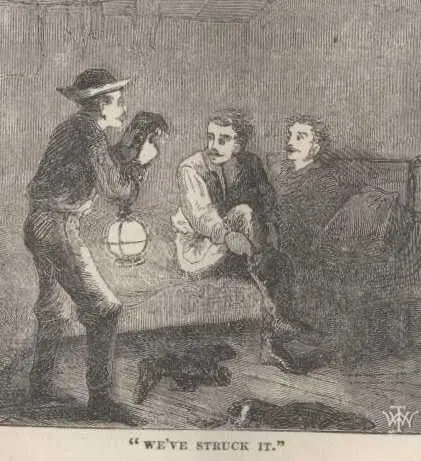
"What! Where is it? When? Coal? Let me see it. What quality is it?" were some of the rapid questions that Philip poured out as he hurriedly dressed. "Harry, wake up, my boy, the coal train is coming. Struck it, eh? Let's see?"
The foreman put down his lantern, and handed Philip a black lump. There was no mistake about it, it was the hard, shining anthracite, and its freshly fractured surface, glistened in the light like polished steel. Diamond never shone with such lustre in the eyes of Philip.
Harry was exuberant, but Philip's natural caution found expression in his next remark.
"Now, Roberts, you are sure about this?"
"What—sure that it's coal?"
"O, no, sure that it's the main vein."
"Well, yes. We took it to be that"
"Did you from the first?"
"I can't say we did at first. No, we didn't. Most of the indications were there, but not all of them, not all of them. So we thought we'd prospect a bit."
"Well?"
"It was tolerable thick, and looked as if it might be the vein—looked as if it ought to be the vein. Then we went down on it a little. Looked better all the time."
"When did you strike it?"
"About ten o'clock."
"Then you've been prospecting about four hours."
"Yes, been sinking on it something over four hours."
"I'm afraid you couldn't go down very far in four hours—could you?"
"O yes—it's a good deal broke up, nothing but picking and gadding stuff."
"Well, it does look encouraging, sure enough—but then the lacking indications—"
"I'd rather we had them, Mr. Sterling, but I've seen more than one good permanent mine struck without 'em in my time."
"Well, that is encouraging too."
"Yes, there was the Union, the Alabama and the Black Mohawk—all good, sound mines, you know—all just exactly like this one when we first struck them."
"Well, I begin to feel a good deal more easy. I guess we've really got it. I remember hearing them tell about the Black Mohawk."
"I'm free to say that I believe it, and the men all think so too. They are all old hands at this business."
"Come Harry, let's go up and look at it, just for the comfort of it," said Philip. They came back in the course of an hour, satisfied and happy.
There was no more sleep for them that night. They lit their pipes, put a specimen of the coal on the table, and made it a kind of loadstone of thought and conversation.
"Of course," said Harry, "there will have to be a branch track built, and a 'switch-back' up the hill."
"Yes, there will be no trouble about getting the money for that now. We could sell-out tomorrow for a handsome sum. That sort of coal doesn't go begging within a mile of a rail-road. I wonder if Mr. Bolton would rather sell out or work it?"
"Oh, work it," says Harry, "probably the whole mountain is coal now you've got to it."
"Possibly it might not be much of a vein after all," suggested Philip.
"Possibly it is; I'll bet it's forty feet thick. I told you. I knew the sort of thing as soon as I put my eyes on it."
Philip's next thought was to write to his friends and announce their good fortune. To Mr. Bolton he wrote a short, business letter, as calm as he could make it. They had found coal of excellent quality, but they could not yet tell with absolute certainty what the vein was. The prospecting was still going on. Philip also wrote to Ruth; but though this letter may have glowed, it was not with the heat of burning anthracite. He needed no artificial heat to warm his pen and kindle his ardor when he sat down to write to Ruth. But it must be confessed that the words never flowed so easily before, and he ran on for an hour disporting in all the extravagance of his imagination. When Ruth read it, she doubted if the fellow had not gone out of his senses. And it was not until she reached the postscript that she discovered the cause of the exhilaration. "P. S.—We have found coal."
The news couldn't have come to Mr. Bolton in better time. He had never been so sorely pressed. A dozen schemes which he had in hand, any one of which might turn up a fortune, all languished, and each needed just a little more money to save that which had been invested. He hadn't a piece of real estate that was not covered with mortgages, even to the wild tract which Philip was experimenting on, and which had, no marketable value above the incumbrance on it.
Читать дальшеИнтервал:
Закладка:
Похожие книги на «The Gilded Age / A tale of today»
Представляем Вашему вниманию похожие книги на «The Gilded Age / A tale of today» списком для выбора. Мы отобрали схожую по названию и смыслу литературу в надежде предоставить читателям больше вариантов отыскать новые, интересные, ещё непрочитанные произведения.
Обсуждение, отзывы о книге «The Gilded Age / A tale of today» и просто собственные мнения читателей. Оставьте ваши комментарии, напишите, что Вы думаете о произведении, его смысле или главных героях. Укажите что конкретно понравилось, а что нет, и почему Вы так считаете.





